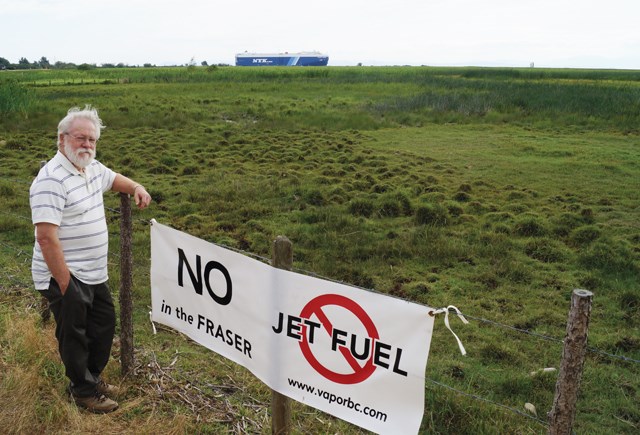A six-day court challenge against a consortium of airline corporations proposing to build a jet fuel terminal on the south arm of the Fraser River concluded Friday as the challengers hope to stop the project in its tracks.
The grassroots environmental group VAPOR and retired biologist Otto Langer took the provincial government and the Vancouver Airport Fuel Facilities Corporation to court, claiming the public consultation process amounted to a mere formality.
“We’re hoping if there is a setback then common sense can set in for what I view as an irresponsible project,” said Langer.
A B.C. Supreme Court judge may have a ruling on the case as early as spring.
VAPOR and Langer are hoping the project will be denied and VAFFC will have to go back to square one. If that’s the case Langer suggests the airlines consortium take a “serious” look at a pipeline from an already established port facility in Ferndale (Cherry Point).
Airlines want to gain access to potentially cheaper offshore fuel from Asia. But opponents of the project say the potential for toxic fuel spills on the Fraser far outweighs the airlines’ need to save money.
Langer said there was no procedural fairness that led to a December 2013 decision by the BC Environmental Assessment Office to approve the project.
“To be honest the province rubber stamped it and said ‘done,’” said Langer.
He points to a number of alleged flaws that his lawyer presented in the case: VAFFC published mandatory communications in English for local Chinese news organizations; people were limited to two minutes of speaking at a “public hearing” and dozens of those statements were never recorded and submitted to the EAO; an initial 45-day consultation process wasn’t even enough time for the City of Richmond to review 1,500 pages of documents; and up to eight reports were conducted after the period of public consultation closed, including a tanker traffic study on the river, toxicity to fish and compensation plans.
“We weren’t able to comment on any of those studies,” said Langer.
As a retired Fisheries and Oceans biologist, he said he had time to review at least some of the project but most people had no real chance to educate themselves.
“I think the whole process was undemocratic and unfair. If this is the process, it needs to change,” said Langer.
He noted the judge has several options, and among them are send the process back to square one, throw out VAPOR’s challenge entirely, or allow the project to continue but order the province to change its public consultation process.
The City of Richmond never joined VAPOR’s challenge, claiming it stands no chance of succeeding.
When the Richmond News requested the memos, and communications for the legal advice it received, the city stated the 682 pages worth of documentation must be withheld from the public for purposes of “public body confidences, policy advice, legal advice and disclosure harmful to personal privacy.”
After Langer raised about $50,000, Richmond City Council donated $2,500 to the group for the challenge.



